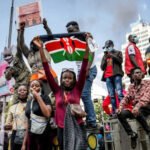Nigeria’s inflation rate recently increased to 20.77 percent on year-on-year basis in September 2022, according to data from the Nigerian Bureau of Statistics (NBS).
The agency said the figure is 4.14 percent points higher compared to the 16.63 percent recorded in September 2021.
The implication of this is that the purchasing power of Nigerians will continue to diminish and food prices will rise more.
Speaking to Development Diaries, Senior Economist, Paul Alaje, said for the average citizen, it means that purchasing power has tactically reduced.
‘If you have N1,000, automatically that amount has become N800. The money value has been reduced for less than 20 percent’, he said.
‘Life will become terribly difficult for people’.
Causes of Inflation
According to the NBS, the factors responsible for the annual inflation increase include an interruption in the supply of food products, increase in import cost due to persistent currency depreciation and a general increase in the cost of production.
Alaje said the rising inflation is driven by importation mostly. He added that factors like the current flooding and the Russia-Ukraine war are also major contributors to the current rise.
The impact of the current flooding has already been felt in agricultural production. Nigeria does not produce enough rice, and with the floods overtaking rice farms, there is an increase in demand and the consequence is inflation in food prices in the coming months.
Loss of farm produce and livestock in large quantities would definitely have a huge negative impact on the economy. As the prices of food continue to surge, the standard of living would keep declining if there is no commensurate rise in income.
What government has done and can do
In September 2022, the policy-setting committee of the Central Bank of Nigeria (CBN) raised the monetary policy rate (MPR), which measures interest rate, from 14 percent to 15.5 percent, the third consecutive increase in 2022.
The apex bank said it will keep increasing the interest rate to reduce the high effect of inflation
The CBN has used all the tools in its disposal to stem inflation to no avail and this can be attributed to other macroeconomic factors that are affecting inflation which have not allowed inflation to subside.
‘Government cannot do anything than what has been done. It will be difficult to find short-term solutions to inflation’, Alaje said.
The economist warned further that Nigerians should expect slower economic growth in 2023, and that inflation will increase further.
‘The reasons Nigerians should expect a further increase in inflation rate are: the recent floods, Russia war will continue to fuel inflation, we are in a political season, we are gradually approaching festive period’, he added.
No Nigerian Should Go Hungry – AfDB’s Adesina
Meanwhile, President of the African Development Bank (AfDB), Akinwumi Adesina, has said that there is no reason for anyone to go hungry in Nigeria.
Adesina said this during the launch of the Special Agro-industrial Processing Zones (SAPZs) in Abuja, the nation’s capital.
It is understood that the new economic zones are designed to cluster agro-processing activities within areas of high agricultural advantage, bringing together agricultural producers, processors, aggregators, and distributors.
Long-term solutions
There is a need for the CBN to carry the organised private sector (OPS) along in its effort to tame the continuous rise in inflation.
The apex bank should also look towards providing medium-term and long-term solutions to the rising inflation, not short-term solutions.
For its part, the federal government needs to take proactive measures to salvage the number of Nigerians who will be pushed below the poverty line as a result of this rising inflation.
Photo source: Zouzou Wizman





